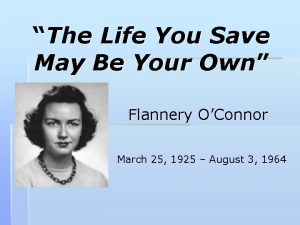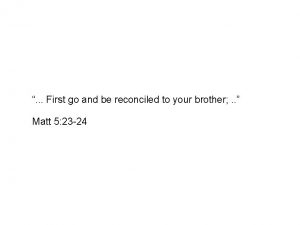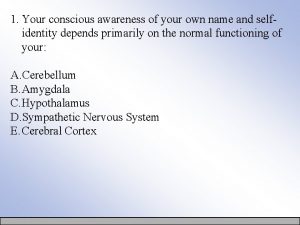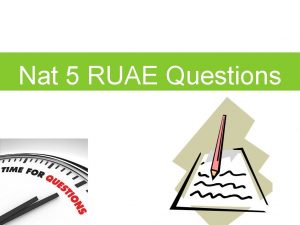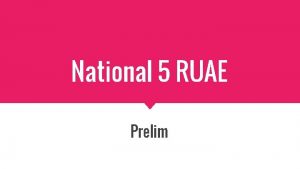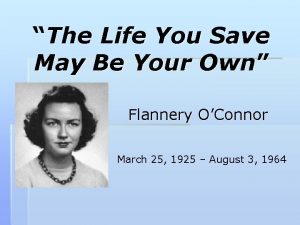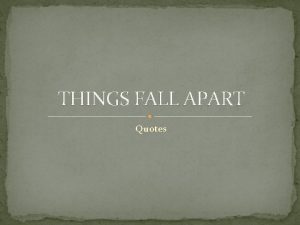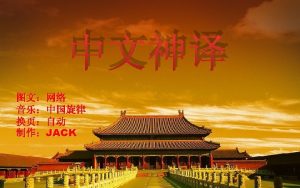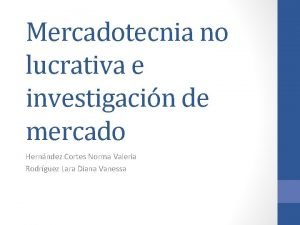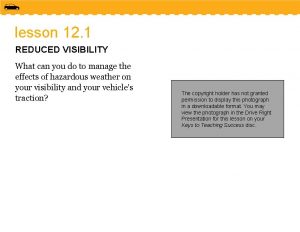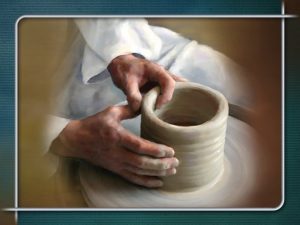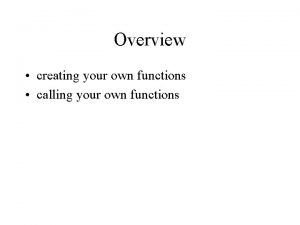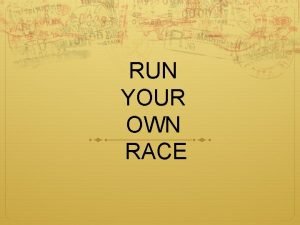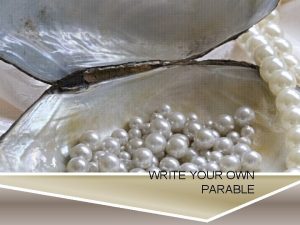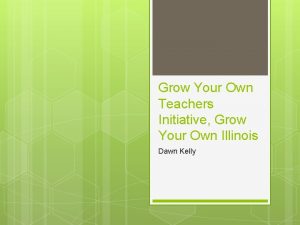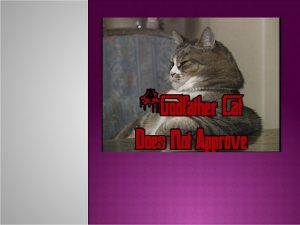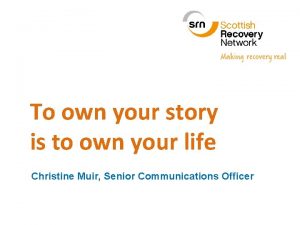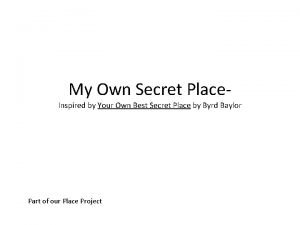Questions where you have to use your own





















- Slides: 21

Questions where you have to use your own words

• The majority of “Understanding” questions require you to use your own words. • In these questions you should not quote any words from the passage at all or you will get no marks. • You can only use words from the passage if there is no other logical alternative.

• More than half of all questions in the exam will be questions where you have to answer in your own words.

3 -Step-method • 1. Read the question carefully. • 2. Look closely in the passage to find the information you are looking for. • 3. Translate the information into your own words. You do not have to write in sentences.

Questions

1. Explain why, according to the writer, Glasgow was an important world city in the past (1) • Glasgow is a city which has experienced constant change and adaptation, from its period as a great industrial city and as the Second City of Empire, to its latter day reinvention as the City of Culture and the Second City of Shopping. This is a city with pull, buzz, excitement, and a sense of style and its own importance. It has a potent international reach and influence. Glasgow’s story continually weaves in and out of a global urban tapestry: following the trade threads of Empire, there are nearly two dozen towns and cities around the world named after Glasgow— from Jamaica to Montana to Nova Scotia. And there is even a Glasgow on the moon.

• Any one of the following for 1 mark: • 1. important for industry/manufacture • 2. second only to London as Imperial symbol • 3. important for international commerce

2. What is the writer’s main criticism of the way the “politicians and the Establishment” run Glasgow? (1) • The politicians and the Establishment talk the language of “opportunity”, “choice” and “diversity” for the people of the city, but do not really believe in or practise them. They impose a set menu, rather than the choice offered “à la carte”, confident that they know best. For all the rhetoric about new ways of working, partnership and collaboration, there can still be a very old-fashioned top-down approach in parts of institutional Glasgow that retains a faith that experts and professionals must hold all the answers. There is an implicit belief that people are poor because of low aspirations and Glaswegians are unhealthy because they won’t accept responsibility, make the right choices and eat healthily.

• Any of the following for 1 mark: • 1. their hypocrisy • 2. their methods are paternalistic/“nanny knows best” • 3. the solutions are imposed from on high/any consultation is sham • 4. they have low expectations of what can be achieved

3. Explain which groups of people are being attracted to cities. (2) • In a world changing faster now than ever before, the dispossessed and the ambitious are flooding into cities swollen out of all recognition. Poor cities are struggling to cope. Rich cities are reconfiguring themselves at breakneck speed. China has created an industrial powerhouse from what were fishing villages in the 1970 s. Lagos and Dhaka attract a thousand new arrivals every day. In Britain, central London’s population has started to grow again after 50 years of decline.

• Gloss on the following two terms for 1+1: • “the dispossessed” people who are homeless, displaced, driven from their own land, alienated from their own society, poor people, people with few possessions • “the ambitious” people with a strong desire to succeed, to get on in life, to better themselves, to make money (undeveloped variants of “ambitious” – eg “people with ambitions”: 0)

4. Explain in your own words why the writer seems surprised that there is so much coverage of the “countryside debate” (2) • The “countryside debate” has rarely been out of the news in Britain in recent years. Reading the newspapers, watching television, listening to the radio, entering a bookshop, one could be forgiven for thinking that we still live in small peasant communities dependent upon the minutest shift in agricultural policy. Sometimes it has seemed almost as if we were still in the early nineteenth century when we relied on the countryside to survive, so extensive have been the debates, so fierce the passions aroused.

• 1. idea that we are still a rural society (1) affected by farming laws (1) Or, 2. as if we were still living in the past (1) when we were more rurally dependent (1)

5. explain in your own words what the writer believes to be a “particularly worrying aspect of the new rural mania” (2) Yet there is a particularly worrying aspect of the new rural mania that suggests it might finally do the countryside more harm than good. This is the identification, in the current clamour, of the countryside in general and the landscape in particular with the past—the insistence on the part of those who claim to have the best intentions of ruralism at heart that their aim is to protect what they glibly refer to as “our heritage”. This wildly over-used term is seriously misleading, not least because nobody appears ever to have asked what it means.

• Any two of the following for 1 mark each, although an effective handling of a single point (eg point 1) might be worth 2 marks: • 1. acceptable gloss on “identification. . . of the countryside in general and the landscape in particular with the past”, eg that rural features are the only way of understanding our history • 2. desire to preserve what is perceived as “our heritage” • 3. difficulty in defining what is meant by the term “our heritage”

What two contrasting emotions does the writer have about the plan to put the great university libraries online? (2) The internet search engine Google, with whom I spend more time than with my loved ones, is planning to put the contents of the world’s greatest university libraries online, including the Bodleian in Oxford and those of Harvard and Stanford in America. Part of me is ecstatic at the thought of all that information at my fingertips; another part of me is nostalgic, because I think physical libraries, booklined and cathedralquiet, are a cherished part of civilisation we lose at our cultural peril.

• Acceptable gloss on “ecstatic” (1) − eg joyous, thrilled, excited, delighted …; “happy” by itself is not acceptable − there must be some idea of intensity • Acceptable gloss on “nostalgic” (1) − eg looking back fondly, wistful, regretful, reflective, … “sad/unhappy” by itself not acceptable − there must be some idea of something connected with past OR the idea that he is apprehensive, fearful (at possible loss/demise of libraries) (1)

In your own words, as far as possible, give four reasons the writer presents in favour of maintaining traditional public libraries. (2) It may well be that public demand technical change mean we no longer need the dense neighbourhood network of local libraries of yore. But our culture, local and universal, does demand strategically situated libraries where one can find the material that is too expensive for the ordinary person to buy, or too complex to find online. Such facilities are worth funding publicly because the return in informed citizenship and civic pride is far in excess of the money spent. Libraries also have that undervalued resource—the trained librarian. The ultimate Achilles’ heel of the internet is that it presents every page of information as being equally valid, which is of course nonsense. The internet is cluttered with false information, or just plain junk. The library, with its collection honed and developed by experts, is a guarantee of the quality and veracity of the information contained therein, something that Google can never provide.

1 idea of accessibility (ie acceptable gloss on “strategically situated”) 2 idea of free access (ie acceptable gloss on “too expensive … to buy”) 3 idea that resources are more sophisticated (ie acceptable gloss on “too complex to find online”) 4 idea of supporting democratic responsibilities (ie acceptable gloss on “informed citizenship”) 5 idea of community awareness/cohesion (ie acceptable gloss on “civic pride”) 6 idea of professional support (ie acceptable gloss on “trained librarian”) 7 idea of informed/refined selection (ie acceptable gloss on “honed and developed by experts”) 8 idea of high standard of material (ie acceptable gloss on “quality … of information”) 9 idea of authenticity (ie acceptable gloss on “veracity of information”) 10 idea of selectivity of information (in contrast with junk online)

Using your own words as far as possible, explain why the writer believes libraries will “survive” (2) And the traditional library will also survive, because a library is central to our understanding of what it is to be human. Libraries are not just for reading in, but for sociable thinking, exploring and exchanging ideas. They were never silent. Technology will not change that, for even in the starchiest heyday of Victorian self improvement, libraries were intended to be meeting places of the mind, recreational as well as educational.

• 1 acceptable gloss on “central to our understanding of what it is to be human” – libraries allow us to find out about life and our position in it • 2 acceptable gloss on “sociable thinking, exploring and exchanging ideas” – function of libraries as a meeting place for discussion • 3 acceptable gloss on “recreational” – libraries as places of relaxation or even romance
 What type of sae is when you own your own business
What type of sae is when you own your own business Any question thank you
Any question thank you The life you save may be your own setting
The life you save may be your own setting Definition of intramurals
Definition of intramurals How you use ict today and how you will use it tomorrow
How you use ict today and how you will use it tomorrow If you have a problem with your brother leave your offering
If you have a problem with your brother leave your offering You are not rejected
You are not rejected In your notebook,define the following
In your notebook,define the following Your conscious awareness of your own name and self identity
Your conscious awareness of your own name and self identity How to answer ruae questions nat 5
How to answer ruae questions nat 5 Ruae national 5
Ruae national 5 In your own words questions
In your own words questions Zero conditional affirmative negative interrogative
Zero conditional affirmative negative interrogative The life you save may be your own title meaning
The life you save may be your own title meaning Things fall apart mosquito story
Things fall apart mosquito story The life you save may be your own dramatic irony
The life you save may be your own dramatic irony Put your right foot in
Put your right foot in Do you love rain
Do you love rain Prism with 6 faces
Prism with 6 faces Lucrativae
Lucrativae Source cards
Source cards When your headlights shine into fog
When your headlights shine into fog


